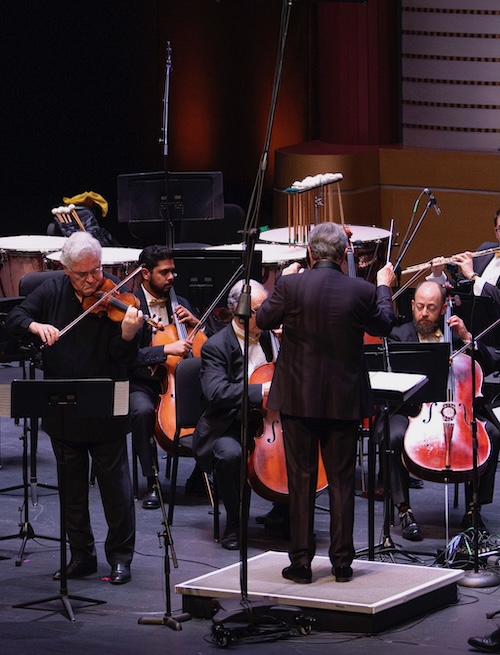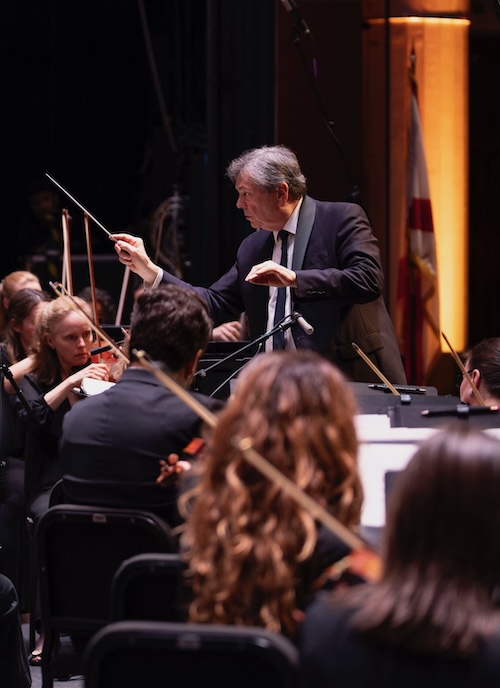Zukerman brings his suave, polished musicianship to Palm Beach Symphony

Pinchas Zukerman performed with Gerard Schwarz and the Palm Beach Symphony Monday night at the Kravis Center. Photo: IndieHouse Films
A big attraction of Palm Beach Symphony concerts is the parade of world-class soloists who perform with the orchestra on the Kravis Center stage.
The star Monday was Pinchas Zukerman, the Israeli-born violinist whose name routinely appears on lists of the instrument’s greatest virtuosos of the past half-century.
At 75, with a full head of snowy hair, the tall, black-clad violinist can still produce that velvet tone with a touch of grit that make his performances so distinctive. His bowing is smooth, his intonation on target. He still works hard, on Monday performing a Mozart concerto, two short works by Tchaikovsky and an encore.
He opened with Tchaikovsky’s Sérénade Mélancolique, drawing a rich tone from the violin’s lowest string over a glowing accompaniment from the orchestra conducted by Gerard Schwarz. If the lighter middle section came off as more strident than graceful, the performance was still carried over by Zukerman’s warmth and phrasing. He lightened his tone for Tchaikovsky Mélodie, playing the famous tune with a radiant tone and a touch of schmaltz.
Less successful was the opening movement of Mozart’s Violin Concerto No. 3, making a rare concert appearance at a time when most violinists prefer the flashier concertos of Sibelius, Tchaikovsky and the rest. The performance was technically immaculate, the quick notes coming in clean cascades, the chords of the cadenza ringing out clearly. But both soloist and orchestra played in a too subdued manner—yet with the orchestra occasionally drowning out Zukerman—with little of the buoyancy and joy that the movement expresses in the most successful performances.
The Adagio came off better. Zukerman played with the heavy vibrato he might have brought to a Romantic-era slow movement, playing the long melodies with a singing tone over the glowing sounds of the orchestra. The concluding Rondo came off with rustic vigor, with Zukerman dispatching rapid downward runs with aggressive bite.
As an encore, he performed the Israeli national anthem, Hatikvah, after saying a few words—largely inaudible from Row P—about the country’s trauma in the current war. He invited members of the audience to stand and sing the words to the turbulent, minor-key melody, which many did.

Gerard Schwarz led the Palm Beach Symphony in music of Mozart, Sibelius and others Monday night. Photo: IndieHouse Films
The concert opened with Four Hymns Without Words for trumpet and orchestra by the contemporary American composer Adolphus Hailstork, composed to serve as music for weddings and other occasions. The simple melodies with triadic harmonies had the ageless quality of American church music.
Trumpet soloist Craig Morris—the Palm Beach Symphony’s principal who teaches at the University of Miami’s Frost School of Music, played with a shining tone, warm vibrato and technical assurance in fast passages, his notes soaring above the orchestra like the voice of a star soprano in the church choir.
The second half was devoted to Sibelius’s Symphony No. 2, the composer’s most popular symphony. With its soaring melodies, theatrical climaxes and opportunities for every section to shine, the Sibelius work gives orchestras the chance to show what they can do, and Schwarz and the Palm Beach Symphony delivered a fine performance
The full, weighted tone of the orchestra, and the clarity and precision of its individual sections, showed how far it’s come in the past ten years or so. Schwarz set an unhurried pace, allowing the music to build from low rumbles to volcanic climaxes. A couple of sloppy entrances aside, the brass had a fine evening, playing with majesty in the first movement and stark, transparent, clanging power in the last.
Winds, from the growling bassoons so favored by Sibelius to the flutes, brought luminous warmth to melodic passages and the chords supporting other sections. Strings played with tight precision, producing frantic tones in the quick parts of the second and third movements, ominous rustling in the mysterious low tones of the third, and big singing tone in the soaring melodies of the third and fourth movements.
The Palm Beach Symphony’s next concert will be 7:30 p.m. February 5 at the Kravis Center. The orchestra will perform the world premiere of Ellen Taaffe Zwilich’s Orchestral Excursions, Tchaikovsky’s “Mélodie” from Souvenir d’un lieu cher, Rimsky-Korsakov’s Scheherazade and the Grieg Piano Concerto with soloist Santiago Rodriguez. palmbeachsymphony.org
Posted in Performances
Leave a Comment
Tue Jan 16, 2024
at 11:05 am
No Comments





